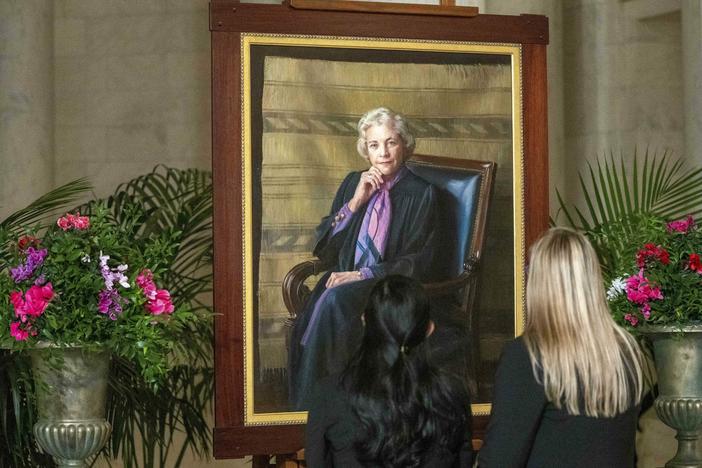Section Branding
Header Content
Sen. Dianne Feinstein dies after 31 record-setting years in Congress
Primary Content
The California Democratic Senator has died at 90 years old. She was the longest-serving female senator in U.S. history and had planned to retire at the end of her term.
Transcript
SARAH MCCAMMON, HOST:
California's trailblazing Senator Dianne Feinstein has died at 90 years old. She was the longest serving female senator in U.S. history and had been a vocal advocate for gun control and climate legislation. Feinstein had planned to retire at the end of her term after suffering health complications that kept her out of Congress for months at a time. Her death leaves vacant a powerful Senate seat that Democrats must now scramble to fill. KQED's Marisa Lagos covers California politics, and she's been covering Feinstein for many years. She joins me now. Hi, Marisa.
MARISA LAGOS, BYLINE: Hey, Sarah.
MCCAMMON: What will Feinstein be remembered for?
LAGOS: Well, I think ultimately, her fights for gun control and just her very strong sort of leadership on the Senate Judiciary Committee for many years will be a big part of her legacy. She fought to declassify a huge torture memo under the Obama administration. I think in her heyday, she was not afraid to pick a fight with both her allies and foes. And of course, she came out of San Francisco. She became mayor here after Supervisor Harvey Milk and Mayor George Moscone were murdered by another - assassinated by another supervisor. And she took control of the city at that time. And I think that that moment is probably the sort of most strong part of her legacy, her standing up and announcing that and then taking control.
MCCAMMON: As you mentioned, she served on key Senate committees, including Judiciary and Appropriations and others. What kind of a void does she leave both in the Senate and in Democratic politics?
LAGOS: I mean, sadly, she's sort of already left it. She has been ailing for years, and I think that she's really declined. You know, her declining health really sort of left that void. But we saw it during the Brett Kavanaugh hearings when there was a lot of disappointment in the fact that she wasn't that voice she had been for so many years. You know, she ran after the Clarence Thomas Anita Hill confirmation hearings in the Year of the Woman. And I think that she, for a very long time, was often the only woman in the room. And so, like, when I think of her, I think that that is one of the biggest things. I think she often spoke up for people who may not have had a voice in Congress at the time she got there, certainly.
MCCAMMON: You know, and because of her declining health, there has been pressure from younger Democrats saying that while they respect the work of trailblazers like Feinstein, it is time for new voices. That was a struggle within the party. How did Feinstein respond to that while she was alive?
LAGOS: Defiantly, I would say. You know, she grew up at a time when, you know, she went to Stanford in the 1950s. There were not a lot of women there. I think she got told no her entire life in politics, and she was not going to go out on anybody's terms but her own. And I think you saw this really crystallize in the last year, even as she continued to decline. She was out for months with shingles. She was not willing to step down until she was ready. And, you know, I think maybe she wanted to stay in that seat, you know, until this happened.
MCCAMMON: But she had announced plans to step down at the end of her term.
LAGOS: Yeah.
MCCAMMON: You know, the race to replace her is already underway. How does her death scramble that race?
LAGOS: Oh, my gosh. Gavin Newsom, our governor, is not having the best morning, I think. He also was close to Dianne Feinstein, called her a dear mentor and lifelong friend. But I think for him, he has promised that he would appoint a Black woman to that seat. There are three members of Congress running, Democrats, including Barbara Lee, who is a Black woman from Oakland, Calif. He did say a few weeks ago that he would not appoint one of the candidates. And so I think he's got a real challenge on his hands now. There is obviously quite some time until next year's election, so he could appoint someone, or he could call a special election.
MCCAMMON: Yeah. What does that process look like in the next 40 seconds or so that we have left?
LAGOS: Yeah. I mean, it's - I think it's going to - I am sure this is what he and his people are talking and thinking about. I think he does not want to put his thumb on the scale of that race, but of course, you know, the razor-thin majority in Congress that Democrats have is going, I believe, to want - you know, make some urgency for them to want to get someone in there. And so he's going to have to try to find - if he wants to keep his promise - a Black woman who doesn't want to run for that seat again. I think it'll be fascinating to watch what he does.
MCCAMMON: KQED's Marisa Lagos covers California politics and has covered Dianne Feinstein for many years. Thanks so much for your time this morning.
LAGOS: My pleasure. Thank you. Transcript provided by NPR, Copyright NPR.
Bottom Content


